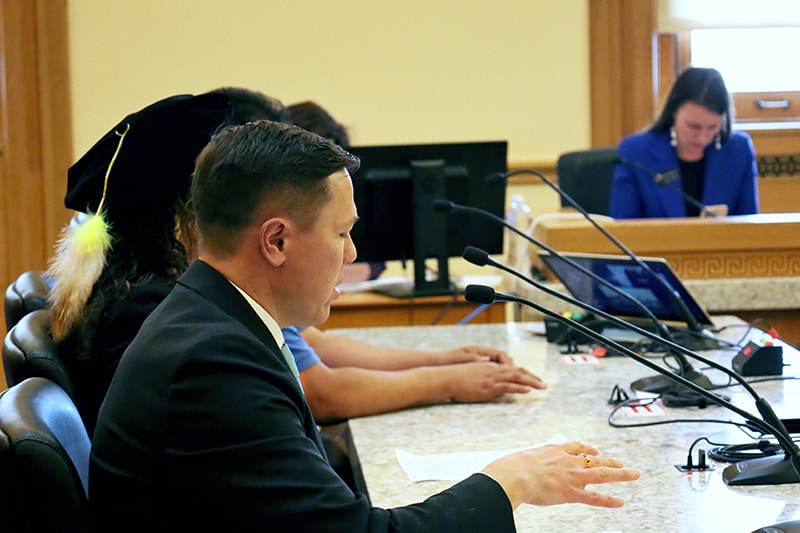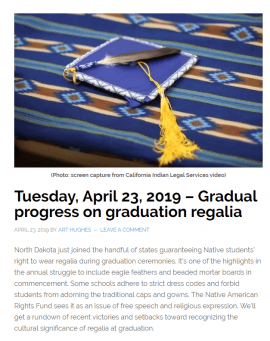
NARF has a long history of assisting students who are prohibited from wearing eagle feathers at graduation ceremonies due to narrow graduation dress codes. We continue to advocate for these graduates so they can celebrate their great successes without sacrificing their tribal identity.
Students, parents, and advocates looking to change narrow graduation dress codes can find resources below.
Background:

Many Native communities consider eagles to be spiritually significant. They believe that eagles carry the peoples’ prayers, and as eagles roam the sky, they have a special connection with the Creator. Their feathers represent honesty, truth, majesty, strength, courage, wisdom, power, and freedom. The United States government has long recognized the importance of eagles for Native religious and spiritual beliefs. In these communities, eagle feathers are given to individuals to mark and honor significant life accomplishments, such as graduation.

Every spring, Native American students from across the country contact NARF because they are being prohibited from wearing eagle feathers at graduation ceremonies. Once schools come to understand the religious, cultural, and academic significance of eagle feathers, most make accommodations and exceptions for Native American students.
Unfortunately, each year some school districts persist in restricting Native American religious liberty and viewpoints. This singling out of Native students puts them in the position of having to choose between participating in the celebration of a great accomplishment with their classmates or following their Native religious and cultural traditions.
Resources for Students and Families:
Federal Resources
The U.S. Constitution’s Free Exercise Clause protects religious practices and recognize the exercise of religion as an unalienable right. The Free Speech Clause of the Constitution also protects the right to free speech. Wearing an eagle feather or regalia to show academic success and religious beliefs should be considered protected practices, and Native students should not be singled out for unique treatment.
The federal government has long considered eagle feathers religious objects. In 1994, the White House issued a Policy Concerning Distribution of Eagle Feathers for Native American Religious Purposes.
State Resources
Alaska
- AS § 14.03.135(a)(4) – Prevents a governing body from adopting school dress codes that prohibit a student from wearing regalia or objects of cultural significance at a graduation ceremony.
Arizona
- Ariz. Rev. Stat. Ann. § 15-348 – A school “may not prohibit a student who is a member of a federally recognized Indian Tribe or who is eligible to be enrolled as a member of a federally recognized Indian Tribe from wearing traditional tribal regalia or objects of cultural significance at a graduation ceremony.”
California
- Education Code § 35183.1 – Wearing of Traditional Tribal Regalia or Recognized Objects of Religious or Cultural Significance as an Adornment at School Graduation Ceremonies; “A pupil may wear traditional tribal regalia or recognized objects of religious or cultural significance as an adornment at school graduation ceremonies.”
Colorado
- Colo. Rev. Stat. § 22-1-142 – Tribal regalia at school graduation ceremonies – “A school or school district shall not prohibit a qualifying student or the qualifying student’s immediate family from wearing and displaying tribal regalia at a graduation ceremony.”
Kansas
- Kan. Stat. Ann. § 60-5321(b) – Prohibits any state agency or municipality, including school districts, from prohibiting an individual from wearing traditional tribal regalia or objects of cultural significance at a public event, including public education graduation ceremonies.
Mississippi
- Miss. Code § 11-61-3 – Prohibits any governmental entity, political subdivision, or official/person acting under color of Mississippi law from prohibiting an individual from wearing traditional tribal regalia or objects of cultural significance at any public event, including public education graduation ceremonies.
Montana
- MCA § 2-1-315 – Tribal Regalia and Objects of Cultural Significance – Allowed at Public Events; “A state agency or a local government may not prohibit an individual from wearing traditional tribal regalia or objects of cultural significance at a public event.”
Nevada
- Assembly Bill 73 – “A pupil of a public school, including, without limitation, a pupil of a university school for profoundly gifted pupils, is entitled to wear traditional tribal regalia or recognized objects of religious or cultural significance as an adornment at a school graduation ceremony.”
North Dakota
- N.D. Cent. Code Ann. § 15.1-19-28 – “The board of a school district or a school may not establish a dress code policy that includes prohibiting a student from wearing traditional tribal regalia or objects of cultural significance at a graduation ceremony.”
Oklahoma
- Okl. Stat. Ann. tit. 70 § 24-160 – “A student enrolled in a public school district, a public charter school, or a technology center school may wear tribal regalia during the school’s official graduation ceremonies, whether held at a public or private location.”
- Oklahoma Religious Freedom Act, Okla. Stat. Ann. tit. 51, § 251 et seq.
- Attorney General Hunter letter about eagle feathers at graduation (October 23, 2018)
- Attorney General Hunter letter about eagle feathers at graduation (May 8, 2019)
Oregon
- Or. Rev. Stat. Ann. § Ch. 45, § 1 – “A school district may not prohibit a student from wearing Native American items of cultural significance at a public school event.”
- Director of the Oregon Department of Education Colt Gill Letter (May 6, 2019)
South Dakota
- SDCL § 13-1-66 – The State “shall not prohibit any person from wearing traditional tribal regalia or objects of cultural significance at a school honoring or graduation ceremony.”
Utah
- Utah Code Ann. § 53G-4-412 – Tribal regalia at high school graduation ceremonies – Any student who is an enrolled member of a federal or state recognized tribe or eligible for enrollment in a federal or state recognized tribe may wear tribal regalia during their graduation ceremony. A public school district “may not prohibit a qualifying student from wearing tribal regalia[.]”
Washington
- Wash. Rev. Code Ann. § 28A.600.500 – “School districts and public schools may not prohibit students who are members of a federally recognized tribe from wearing traditional tribal regalia or objects of Native American cultural significance along with or attached to a gown at graduation ceremonies or related school events.”
- Superintendent of Public Education Chris Reykdal Letter (May 28, 2018)
Brochures for Students and Schools: Wearing Eagle Feathers at Graduation

The Tribal Education Department National Assembly (TEDNA) and NARF have developed two flyers to assist students and families in their quests to wear eagle feathers at their graduation ceremonies. Wearing Eagle Feathers at Graduation: A Guide for Students and Families serves to provide guidance on how to work with school districts to make the request. Wearing Eagle Feathers at Graduation: Information for Schools teaches schools about the significance eagle feathers and plumes hold for graduating students.
Court Cases
- Goodall v. Midway Independent School District
- Titman v. Clovis Unified School District
- Waln v. Dysart School District


